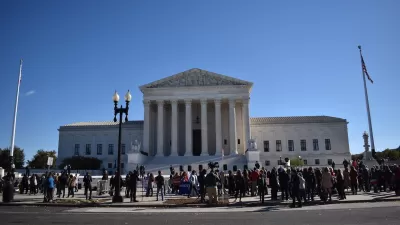Two plaintiffs in Greenfield, Massachusetts, have accused city officials of violating the Takings Clause after the city foreclosed on their properties to recoup unpaid property taxes and then kept all the equity.

A federal judge has denied a motion by the city of Greenfield, Massachusetts, to dismiss a lawsuit accusing the city of taking the excess value of two homeowners’ foreclosed properties over a tax debt. According to an article in the Greenfield Reporter, the plaintiffs alleged Greenfield officials violated their rights under the Takings Clause of the Fifth and Eighth Amendments by foreclosing on three properties to recover approximately $7,339 in combined unpaid taxes and pocketing the approximately $289,000 in combined excess value collected at resale.
The city’s attorney filed the motion to dismiss, claiming the city simply followed the state statutory scheme for tax takings, but “the judge wrote that a significant factor in the case centers around whether the plaintiffs had access to a legal procedure with which they could claim the excess funds under state law,” and he also called the hundreds of thousands of dollars in excess value a “giant windfall” for the city, reports staff writer Anthony Cammalleri.
Cammalleri writes that the judge’s ruling came just days after the Massachusetts Senate passed an amendment to the state’s annual spending plan that would prohibit municipalities and private companies from taking entire equity of a home in the event of a tax lien foreclosure, aiming to bring the state’s home equity laws in line with the last year’s Tyler v. Hennepin County, Minn. Supreme Court ruling that declared this type of practice (which critics call “home equity theft”) unconstitutional.
FULL STORY: Judge denies Greenfield’s bid to dismiss home equity case

Planetizen Federal Action Tracker
A weekly monitor of how Trump’s orders and actions are impacting planners and planning in America.

San Francisco's School District Spent $105M To Build Affordable Housing for Teachers — And That's Just the Beginning
SFUSD joins a growing list of school districts using their land holdings to address housing affordability challenges faced by their own employees.

Vehicle-related Deaths Drop 29% in Richmond, VA
The seventh year of the city's Vision Zero strategy also cut the number of people killed in alcohol-related crashes by half.

The EV “Charging Divide” Plaguing Rural America
With “the deck stacked” against rural areas, will the great electric American road trip ever be a reality?

Judge Halts Brooklyn Bike Lane Removal
Lawyers must prove the city was not acting “arbitrarily, capriciously, and illegally” in ordering the hasty removal.

Engineers Gave America's Roads an Almost Failing Grade — Why Aren't We Fixing Them?
With over a trillion dollars spent on roads that are still falling apart, advocates propose a new “fix it first” framework.
Urban Design for Planners 1: Software Tools
This six-course series explores essential urban design concepts using open source software and equips planners with the tools they need to participate fully in the urban design process.
Planning for Universal Design
Learn the tools for implementing Universal Design in planning regulations.
Borough of Carlisle
Smith Gee Studio
City of Camden Redevelopment Agency
City of Astoria
Transportation Research & Education Center (TREC) at Portland State University
City of Camden Redevelopment Agency
Municipality of Princeton (NJ)





























